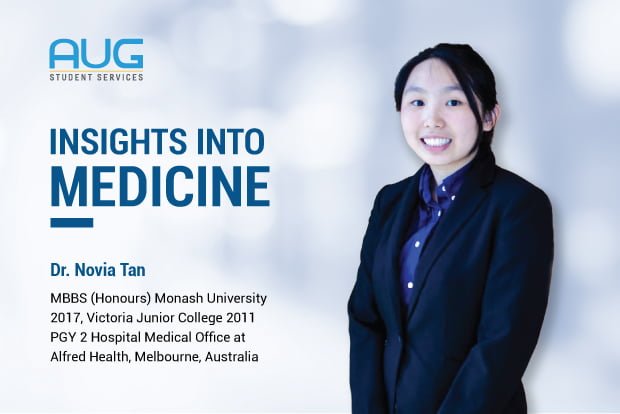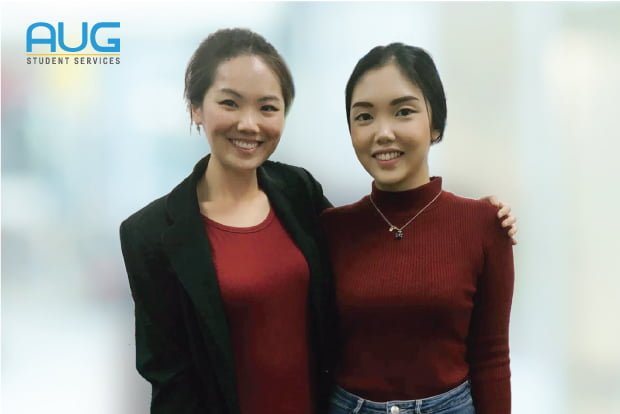Dr Novia Tan is a Monash University Medicine graduate who is currently practising as a Doctor in The Alfred Hospital, one of 2 major adult trauma centres in Victoria and home to the largest intensive care unit in Australia.
AUG Singapore invited Dr Novia Tan down for a talk to share with budding medical students about her Medical School experience.

Here is part 2 of what Novia shared during the talk. Please refer to part 1 here.
How was Medical School split over the 5 years for you?
First and Second Year
For me, these were my pre-clinical years, meaning that I only stayed in the university for lessons or tutorials most of the time.
An average day in my life as a pre-clinical medical student:
- 4 – 5 lectures per day
- Tutorials
- Lab sessions – Anatomy and dissection on cadaveurs (1 hour)
- Problem Based Learning – an actual Doctor will run the tutorial about different cases to ensure students can develop real-world problem-solving skills
- Study group (informal) – formed on your own
I feel that I am quite fortunate as I joined study groups held by Singapore Medical Society Victoria, which allowed me to connect with seniors in Medical School and was equivalent to a “free” Singaporean-run tuition centre. Typically, I would join this session once a week and it runs for about 2 – 3 hours.
Third, Fourth and Fifth Year
For me, these were my clinical years, meaning that I would go to different hospitals and learn from people in the hospital only.
An average day in the life of a clinical medical student (varies everyday):
- Ward Rounds (Typically starts at 7am and sometimes 8am or 9am)
- Bedside tutorials with actual doctors
- Hospital-specific lectures (based on their specialities)
- Study group – formed on your own
- Assignments – essays, presentations
- Objective Structured Clinical Examination (OSCE)
Are the examinations difficult in Medical School?
I did not experience difficulties in the final examinations, as they were mainly MCQs. This is particularly because there were assignments and essays that counted towards the final grade, meaning that the final examinations did not have such a high weightage in terms of marks. However, I found that OSCEs were rather difficult. In Singapore, exams are very theoretical but OSCEs are very hands-on and require intensive practice before hand, perhaps with your friends or during study groups.
OSCEs are examinations of your clinical skills on “fake patients”. An example would be for clinical students to do examinations of their classmate’s abdomen, indicating what kind of symptons they should look out for.
Can I choose which hospital I am allocated to?
I did not have a choice of which hospital I would be allocated to.
How can I get to different hospitals?
It’s okay if you don’t have a car but you have to be lucky for the hospital to be near you. Sometimes, it may require an hour drive just to get to the hospital. It’s about your luck.
Will I be very stressed during Medical School?
I had a lot of support as I joined many activities organised by Singapore Medical Council Victoria, meaning that I could get in touch with seniors, juniors and friends who were going through the same experience. For example, I had joined one particular Hospital and felt a bit lost as it was my first week there. While walking along the corridor, I bumped into a fellow Singaporean whom I had met during one of the events and it was easier to adapt to the clinical placements in that hospital, learning procedures and completing tasks together with him.
Nonetheless, I do agree that it is important to make use of your support network and have a chat with your friends / seniors as I have had a few friends who have suffered from mental health issues. Therefore, it is important to take care of your mental health, aside from studying.
Where should I stay, on-campus or off-campus?
During the clinical years, I went back to school for lectures perhaps once a month so it was a difficult choice between staying on-campus or near the hospital I was placed at. Fortunately, my hospitals were within a reasonable distance from the Monash campus in Clayton, meaning that I could travel to and fro from my hospital placements to home quite easily.
Are there ways to reduce my school fees?
I chose to stay on-campus for all 5 years that I was in Medical School as I was a residential advisor in the hall I stayed at. This meant that outside of Medical School, I was also paid to organise activities and ensure everyone’s safety and well-being were well taken care of.
I paid about A$1.1k – A$1.2k per month (utilities included) and saved about A$400 per month as a residential advisor.
Furthermore, you can apply for the employment grant by MOHH, which covers up to 60% of the remaining years of your tuition fees and includes a bond with the public healthcare clusters in Singapore.
Full Series: What Medical School is really like? Part 1 / Part 2

 Register
Register Login
Login


